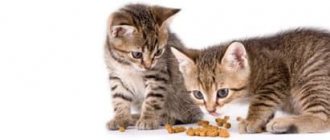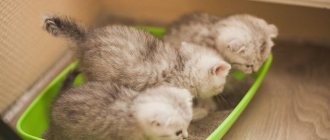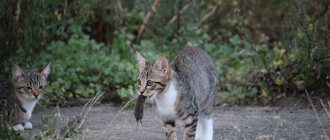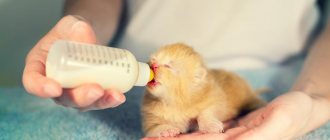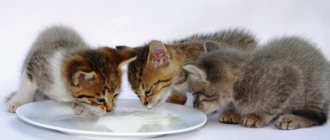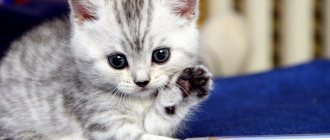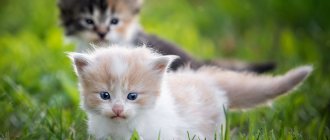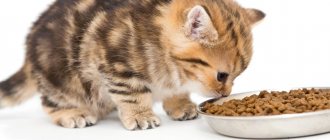What will you learn from the article?
- Kitten feeding regimen
- What foods can you feed a kitten?
- What to feed a one-month-old kitten (up to 1 month) What foods should you not feed a kitten
- Dry food for kittens
This article will help you learn how to feed your kitten correctly , calculate the diet, and avoid giving junk food.
Find out what food should be supplied to a small body in order for it to grow into a big, handsome cat.
What dangers await kittens at the bowl?
- unbalanced diet
Improper feeding affects the growth and development of the baby, leading to external defects and internal problems, and sometimes even death.
- poorly selected nutrition
The wrong choice of ready-made food, natural nutrition that causes allergic reactions - all this also negatively affects the growing body.
It is also important not to forget about a certain feeding schedule that is different from the schedule of an adult cat. Scary? Don't be shy, we'll figure it out!
Kitten feeding regimen
First, it is important to understand WHEN to introduce complementary foods and how often to feed the kitten. You, of course, can be guided by the kitten's hungry look, but it is better not to awaken the beast in him, and 3-4 weeks after birth, begin to gradually feed the baby.
By 4 weeks of age, a stable eating schedule should be established.
The baby should receive additional feeding 4-7 times a day.
But there are stalemate situations when kittens need additional feeding much more often.
How many times a day to feed:
- age up to 2 weeks – 10 times a day (with night coverage);
- feeding a one-month-old kitten – 8 times a day (including the night);
- 1 – 2 months – 7 times a day (night is already excluded);
- 2 – 3 months – 6 times a day;
- 4 months – 5 months – 5 times a day;
- 5 – 9 months – 4 times a day;
- 9 – 12 months – 3 times a day;
- Feeding kittens from 1 year of age becomes twice a day (for example, 9:00 – 21:00).
How much should a kitten receive per day?
- Age 1 week – 30 ml per 100 g of kitten weight;
- 2 weeks – 38 ml per 100 g of kitten’s weight;
- 3 weeks – 48 ml per 100 g of kitten’s weight;
- 4 weeks and subsequent – 48-53 ml per 100 grams of kitten weight.
Of course, it’s easy to calculate the amount of feed based on the items already proposed, but we’ll make the task easier and give a few numbers:
- At 1.5 months, a baby needs about 120 grams of food per day;
- We feed a two-month-old kitten more - 160-180 grams per day;
- During the period of active growth (3 months - 6 months), the daily food intake is 180-240 grams, with at least 40 grams of meat;
- A six-month-old baby needs up to 180 grams of food per day;
- At 10-12 months, the period when the kitten’s activity decreases, the daily food intake is 150-200 grams.
It is important to give vitamins to your pet. Read what vitamins to choose for a kitten.
Natural food
Some owners think that natural food for kittens is the same food that people eat, for example, sausages, cutlets, sausages. In fact, a natural diet implies the presence of ingredients that are healthy and necessary for the baby.
The owner’s task will be to prepare food taking into account the age of the kitten and its characteristics
You need to feed your pet foods that contain proteins, fats and carbohydrates.
To answer the question of what to feed a 2-month-old kitten, you should understand which foods contain the main microelements. Protein is found in meat, fish and eggs. Egg whites, offal and butter are rich in fats. Pets get carbohydrates from cereals (rice, buckwheat, millet, oatmeal).
The best meats are chicken and turkey. It is recommended to combine it with various cereals.
Important! Meat for a small pet must be finely mixed with the porridge so that the cat does not choose only the most delicious pieces from the plate. The finer the food is ground, the better the food will be absorbed.
It must be remembered that at 2 months kittens still cannot grind food well.
The finer the food is ground, the better the food will be absorbed. It must be remembered that at 2 months, kittens still cannot grind food well.
Don't forget about dairy products. Cottage cheese or low-fat yogurt can be given as a second meal after the main meal.
Fresh and boiled vegetables are considered healthy. It is best to feed green foods (except grapes and avocados). For “Scots”, red vegetables are prohibited, as they can cause allergies.
Several times a week you need to add half a teaspoon of butter and vegetable oil to your food. This product has a good effect on the digestion and toilet of a small pet.
Once a week your diet should include:
- sea fish;
- liver;
- egg yolk.
There is also a mixed type of diet, which causes controversy among experts about its beneficial properties. There are two conflicting opinions:
- A good diet should include a variety of foods, as kittens need to receive many vitamins and nutrients. A mixture of ready-made and homemade food will ensure normal growth and development of the baby.
- This type of nutrition is harmful, since the same vitamins contribute to the accumulation of similar substances in the body, which leads to hypervitaminosis.
Both opinions are considered correct, so it is best to consult a veterinarian. Experts advise choosing food for 2-month-old kittens individually.
Mixed nutrition is recommended for caring for straight-eared breeds.
Advantages and disadvantages
Benefits of homemade food:
- the owner chooses the diet himself, based on his capabilities, so he will know what the baby’s food consists of;
- varied diet;
- there is no need to use special recipes for cooking, since it is enough to boil the food;
- The pet is not dependent on a certain type of food.
Flaws:
- there are prohibited foods that should not be given to a cat;
- the owner needs to spend his time preparing food for the pet;
- Kittens do not always receive the full range of vitamins with homemade food.
When preparing a diet, you need to find out what to feed a 2-month-old kitten so as not to harm it. In general, the list of prohibited foods applies to all breeds, but there may be some differences.
What foods can you feed a kitten?
Remember that the food you put in your kitten's bowl should never be hot or cold. It is optimal if the food is at room temperature.
It is important to remember the consistency of food - it is better if the first portions are mushy and do not contain solid pieces. At home, a blender or an ordinary grater for milking vegetables will help with this.
So, what to feed a kitten:
- Meat. It can be raw, boiled, frozen and scalded. 60-80% of a kitten's daily diet comes from lean meat. What kind of meat is suitable for a kitten - see the table below;
- Liver. Offered once every 1-2 weeks;
- Porridge. In their pure form, the kitten is unlikely to be interested in them, but adding meat or vegetables radically changes the matter. Mix porridge with meat in a 1:2 ratio;
- Vegetables. Fresh or boiled;
- Eggs. What do kittens eat from eggs? Exclusively yolk. It is useful to give a raw yolk to a kitten once a week. Pay special attention to quail eggs - they are very healthy and quail eggs can be given whole, without separating the white from the yolk;
- Fermented milk products with low fat content;
- Brewer's yeast;
- Oil. Experts recommend avoiding vegetable oil and replacing it with Vaseline.
Liquid on the kitten's menu
Water plays a vital role in metabolic processes. With a lack of fluid, vital processes slow down, creating a risk of disturbances and malfunctions in the functioning of organs and systems, and development is inhibited. Therefore, water deserves special attention.
Kittens that are fed by a cat do not need additional liquid. But when introducing complementary foods, it is necessary to ensure drinking. Not all kittens readily drink water. If the baby refuses to drink, you need to give him food with a liquid consistency. To do this, add a little water to the food. You can pour it into a separate bowl. In some cases, pets gradually get used to drinking water regularly.
What to feed a one-month-old kitten (up to 1 month)
A well-fed kitten either sleeps peacefully or quietly sucks the cat. But if kittens crawl around their mother, refuse the nipple, squeak and grab an outstretched finger - these are signs that the child is hungry.
Where to start with complementary feeding or full feeding of a week-old pet?
Prepare a bottle with a nipple, a dropper or syringe without a needle, and a special mixture designed to replace cat milk for a week-old kitten.
Here are some simple recipes on how to feed small kittens at home:
- Raw egg yolk + half a liter of concentrated milk
- Dry yeast (2.5 g) + whole milk powder (15 g) + whole cow's milk (50 g)
- Hard-boiled egg + beaten egg white + vegetable oil (1 g) + grape sugar (4 g)
- Half an egg yolk + corn oil (teaspoon) + whole milk (50 ml)
These and other recipes will also be useful if the kitten grows up without a mother cat and (correctly), its feeding is entirely your responsibility.
Read about recipes for feeding kittens up to a month without a cat
What foods should you not feed your kitten?
- Dry or wet food. There is no unanimity on this issue; rely on your own prudence and intuition. Therefore, here we put a question mark – ?
- Cow's milk. It is better to replace it with goat milk - it is not so fatty for the baby’s digestion. If you can’t get goat milk, then for very small kittens you can buy special powdered milk in pet stores
- Fermented milk products with high fat content
- Fish. In principle, children should not be given fish at all, but theoretically, sea fish is not harmful. Freshwater is prohibited, especially raw water, as it provokes the formation of urolithiasis and can become a source of infection with worms
- Salt, spices
- Sausages
- Potatoes are not at all digestible by the stomach of a domestic cat, so they are not given in any form.
- Legumes. Soy, peas, beans are not digested by the intestines and as a result we get bloating and fermentation in the intestines
- Cheese - due to its fat content
- Pork
- Sweets
- Chocolate. This particular sweet contains theobromine, a poison that causes severe poisoning and death in cats.
- Flour
- Mixed diet is harmful for kittens
Read more about what not to feed.
What should you not give?
Knowledge of how to feed a kitten, what food to choose and what to give will not be enough; it is necessary to have information about which foods are undesirable and even harmful for it. Among the most unfavorable are the following products.
- Cow's milk - as a pet grows up, it begins to experience problems with lactose tolerance, so after drinking milk, its digestion will begin to malfunction.
- Bones – Small bones can get stuck in the throat or esophagus, causing problems. When your pet becomes an adult, you can give him large bones with which he can clean his teeth.
- Smoked and fried foods – no smoked or fried foods should be in a kitten’s diet; they are harmful to both small and adult cats. Such food is very difficult to digest and can negatively affect the health of the pet, causing irreparable consequences.
- Certain vegetables and mushrooms - you should not feed your kitten potatoes, eggplants, onions and garlic, tomatoes, as well as legumes and mushrooms. Such food is difficult to digest and does not bring any benefit to the body.
- Baked goods and sweet foods – all baked goods with a neutral taste, as well as sweet foods, should not be given to the kitten. The same applies to any sweets, including chocolate. This food will only harm your pet's body.
- Salt and seasonings - any food that is prepared for a kitten or an adult should not contain any salt or spices. These components have an extremely negative effect on the pet’s health and cause various diseases in the future.
- River species of fish - unlike the sea variety, fish in rivers are subject to a strong attack of parasites, which, even after heat treatment, do not disappear anywhere, but remain in the kitten’s body, gradually destroying it.
- Fatty meat - you should not feed your pet pork, lard, or fat, because he will have indigestion and liver problems will begin.
- Skin from chicken meat - the kitten is not able to digest this product, so the body will work poorly, waste energy, and in the end will not receive any benefit or energy.
- Egg white – Chicken egg white contains an enzyme that breaks down biotin in the cat’s body.
- Medicines – their consumption is necessary only in rare cases and only with a prescription from a veterinarian.
Can I give it to a kitten - food table
| Product | Can I give it to a kitten? |
| Banana | No |
| Borsch | No |
| Broccoli | Yes |
| Buckwheat | Yes |
| Baby food | Yes |
| Potato | No |
| Kefir | Yes |
| Food for adult cats | No |
| Semolina | No |
| Milk | No |
| Carrot | Yes |
| Oatmeal | Yes |
| Cucumber | Yes |
| Liver | Yes |
| Tomato | Yes |
| Rice | Yes |
| Fish | No |
| Ryazhenka | Yes |
| Sour cream | No |
| Soup | Yes |
| Raw meat | Yes |
| Cottage cheese | Yes |
| Grass | No |
| ground meat | Yes |
| Bread | No |
| Chocolate | No |
| Apple | Yes |
| Egg | Yes |
Natural food
If you are going to accustom your kitten to homemade food, you must adhere to certain conditions. From a very young age, you need to add as many different foods as possible to your pet’s diet. If you don’t teach your child about certain foods in childhood, then most likely it will be very difficult to retrain him as he gets older. Therefore, try to offer different types of products. Otherwise, you risk turning your pet into a picky eater and thus not being able to give him adequate nutrition.
Basic Rules
Basic rules for feeding kittens with homemade food. It is better not to accustom your animal to handouts from the table.
- Firstly, we add a lot of spices to our food, but they only harm animals.
- Secondly, you will have an annoying beggar who will also steal from the table.
Don’t forget to buy your kitten healthy grass that stimulates digestion, serves as an additional source of vitamins and minerals, and promotes effective hair regurgitation. And if you wish, you can not buy anything at all and germinate wheat at home. In any case, do not forget about vitamins. If you have chosen natural food for your kitten, then supplements will definitely be needed.
Food basket for kittens
Let's look at the cat's “food basket” - what you can feed kittens from homemade food, that is, “natural food”. The first thing is meat, namely beef. A bird would also work. It is better to avoid pork; a kitten can easily overeat it out of habit; on top of everything else, it is a source of helminthiasis infection. If we talk about fish, there is nothing better than sea fish. You can get a lot of things from river fish. But even sea fish should be given infrequently - a couple of times a week is more than enough. For young creatures, the meat must be boiled, but older pets can eat it raw, but only in moderation.
What better way to feed a kitten than with milk; there is simply no dearer food for it. However, not every cat will drink cow's milk. In some animals, the stomach simply cannot tolerate it. In such cases, the baby can be given yogurt or other fermented milk product. The main thing is that its fat content is not too high. Another good product for a growing animal is cottage cheese. Small pets are given cottage cheese puree with yolk, milk, or all together. Few people will refuse such “mogol-mogol” and usually the kitten devolves it with great pleasure. You can also pamper your pet with rennet cheese and sour cream.
In order for an animal to develop fully, it requires fiber contained in products of plant origin - these are vegetables and cereals. To compensate for this need, the kitten needs to cook porridge. For the smallest kittens, on a milk basis, and for older animals on meat, chicken, and fish broths. Only legumes should be avoided, since it has already been mentioned that feeding legumes leads to bloating and constipation, and they are also poorly absorbed by the body. Meat and vegetables are added to porridges made with meat broths.
Don't forget that your baby should have 24/7 access to fresh water. This aspect is especially important when feeding dry food. After all, cats that consume store-bought food drink almost four times more water than animals that eat natural products. Change the water regularly, and wash the container underneath and scald it with hot water.
Features of the diet by month
Features of feeding a kitten aged 2 – 4 months
By this age, the kitten has already cut its teeth and it is time to transfer it to autonomous feeding, teaching it to eat and drink from bowls on its own. The kitten's growth is very active, its skeleton is being formed and strengthened, and the gastrointestinal tract is finally formed. What to feed a 2 month old kitten? The baby's diet should be as fortified as possible and especially rich in protein.
Features of feeding a kitten aged 4 – 6 months
At this age, the baby is actively gaining weight, so you need to make sure that the basis of the diet is not foods that are stored as fat, but those that increase muscle mass.
The baby's jaw has already formed and pieces of meat, beef or chicken offal can be given not ground, but cut into pieces. What else do kittens eat at this age? It is recommended to gradually add fermented baked milk or yogurt to low-fat fermented milk products.
Features of feeding a kitten aged 6 – 10 months
During this period, the daily number of feedings is actively reduced. The kitten's growth becomes less noticeable, but its taste preferences are already emerging. Do not indulge the cat's whims and do not give your teenager prohibited foods or food from the table. At this age, you can treat your pet with low-fat sea fish from time to time.
Read what should be in your veterinary medicine cabinet at home.
How to understand the ratings of this rating?
The ratings in this list are based on a comparison of the five manufacturers named specifically with each other, but not in general among all the food on the market in a particular class. So, holistic food did not make it into this top 5 for the reason that they are very expensive and in Russia there are still difficulties with purchasing them - not everyone can order cat food online on foreign sites. It is much more advisable to compare pet products available on domestic sales, about which there are already a sufficient number of reviews.
Consequences of poor nutrition
Proper nutrition for kittens = future health of the cat.
It is not for nothing that at the beginning of the article we focused on how important it is for the kitten to receive a balanced diet.
An imbalance of nutrients (microelements, vitamins, etc.) leads to serious problems with the health of the animal:
- Diabetes
Kittens sometimes have so-called juvenile diabetes. There are individuals who are genetically predisposed to it, so don’t be reckless and don’t provoke the manifestation of the disease with improper nutrition
- Feline vitamin deficiency
– lack of vitamin E (tocopherol) leads to a deterioration in the quality of the coat, irreversible changes in muscles and the development of infertility in the future.
– lack of vitamin C undermines the immune system and can lead to scurvy;
– vitamin D is responsible for calcium-phosphorus metabolism and prevents the development of rickets;
– vitamin A deficiency leads to digestive disorders and development of reproductive organs.
- Allergy
- Poisoning
As we wrote above, there are foods that are literally poison for cats (chocolate, onions, garlic). And it’s good if loose stools are the only and quickly relieved symptom of poisoning. Often, consuming these products can be fatal for your pet.
Of course, this is not the entire list of problems threatening the baby, but we have highlighted the main points.
Basic rules of care
Of course, you no longer notice the features of your home, but a new, unknown world, full of fears and smells, opens up for your kitten. Therefore, many kittens experience a real stressful feeling when moving to a new place of residence. And your task is to brighten up the first minutes and days in which the kitten will settle into the house.
There is no need to force your friendship on the kitten or introduce it to other family members. Believe me, when the time comes, the pet will take a step forward. The only thing you need to do is introduce the baby to the bowl, tray and bed.
Ready-made food for kittens
What is better to feed kittens - dry food or natural food? The question is complex. To feed a kitten with ready-made food or not to feed it – Shakespearean passions have been in full swing for many years. If we assume that good and responsible producers have put all the necessary microelements, minerals, vitamins and additives in a jar or bag of food, then feeding with ready-made food has its place, moreover, it makes life easier for the kitten owner. And reviews from veterinarians about such feeding at home are positive.
The best ready-made food is Akana Regionals (composition details on the official website)
But if you choose this light option, you simply must learn a few important rules:
- The main rule is called “Either-or”. Either ready-made food or natural feeding. You can't mix. Not at all. Not even a drop! Natural food and prepared food are digested differently. The first is absorbed without drinking a lot, and the digestion of dry food requires a lot of moisture, without which enzymolysis does not begin. If you change the types of food, then the kitten’s stomach and intestines will not have time to rebuild and as a result - hello, gastroenteritis, coprostasis (intestinal obstruction) and other troubles
- Is it possible to give a kitten only one food? Need to! Having chosen ready-made food for a kitten, do not change it (food) for another. Each brand has its own blend and balanced composition. By making a cocktail out of food, we risk introducing an imbalance and as a result we will get a strange picture in the kitten regarding calcium, say, or amino acids
- Do not buy mass-market food for your kitten - only specialized food for kittens and only the highest class (holistic, super-premium, premium food). What is below is not food, but fast food, these bright and cheap jars will bring nothing but problems
Dry food for kittens Club 4 Paws “Chicken”
Balanced premium food with high nutritional value (34% protein, 15% fat) is produced in Ukraine. The main ingredients are chicken (26%) and cereals (rice, corn), the food also contains poultry and salmon fat, animal protein, dried vegetables and fruits, brewer's yeast, flaxseed, beet fiber
Benefits of the food:
- meat ingredients are in 1st place in the composition;
- INTEGRAMIX formula for comprehensive health support;
- a mixture of tocopherols as a natural antioxidant and source of vitamin E;
- optimal price-composition ratio.
The disadvantages include the presence of only one taste.
Buy food on Petslike.
Wet food for kittens Club 4 Paws
The K4L line of wet food for kittens is represented by two diets with an attractive taste:
- with chicken in sauce;
- with turkey in jelly.
Advantages of feed:
- high meat content in pieces;
- good vitamin and mineral supplement;
- contain the INTEGRAMIX complex to maintain overall health and immunity;
- no synthetic additives.
Flaws:
- Turkey food contains a small amount of sugars.
Best price on Petslike.
Kitten food Optimeal "Chicken"
Super-premium dry food, produced in Ukraine using Swiss technology. The nutritional value (40% protein, of which 60% is animal origin, 18% fat) meets the needs of kittens.
Advantages of Optimeal kitten food:
- balanced composition;
- chicken meat is added fresh;
- a complex of supplements to support immunity Immunity Support Mix;
- good value for money.
Flaws:
- presence of only one taste;
Buy food from the Pethouse online pet store.
Wet food for kittens Optimeal with chicken
Super premium food contains fresh chicken, beef heart, and chicken liver.
Pros:
- 80% meat in pieces;
- high content of animal proteins – 71%;
- the presence of additives for immunity, skin and coat;
- no artificial additives.
Disadvantages include the lack of information about the origin of cereals, which are included in small quantities in the composition.
Best price here.
What else should you pay attention to?
Diets for kittens from Hill's Science Plan Puppy & Kitten, Royal Canin Size Nutrition Mini Junior and many others are deservedly popular.
But if the picture is clear with elite food, then super-premium or premium food requires a more thorough analysis. Let's look at a few examples.
Which food to choose for a kitten - rating
Dry food for kittens
Almo Nature dry food for kittens
This dry food is very close to VIP food. This Italian diet is based on chicken and its derivatives. Animal protein accounts for 53%, another 14% is non-allergenic rice.
There are not many disadvantages to this food - perhaps only the high price.
Best price in the Staraya Ferma online store.
Acana super premium kitten food
Today Akana offers dishes in three flavors:
- chicken;
- fish;
- lamb.
Benefits of Akana kitten food:
- Balanced diet
- No grains included
- No dyes or artificial additives
Disadvantages of Akana kitten food:
- Narrow range of flavors
- Lack of preventive diets
Buy food on Zoopassage.
Royal Canin dry food for kittens
Premium class in kitten nutrition is the best of the worst, and it is important to remember that the absence of the prefix “super” indicates that the quality of food of this type is, to put it mildly, “not very good.” But let's be objective.
Advantages of Royal Canin kitten food:
- Low price;
- Veterinary line;
- Wide range of flavors;
- Availability for sale.
Buy at the best price in the Staraya Ferma online store.
Disadvantages of Royal Canin kitten food:
- Low quality;
- Questionable composition;
- The manufacturer, Mars, specializes in economy-class feed. It's a hint.
Cat or cat: how to determine gender
Video about proper feeding at home
Wet food and canned food
It is believed that wet food, consisting of 80% water, is more suitable for babies, since it is completely absorbed in the stomach and does not injure the esophagus.
Remember that canned food and pouches should be kept in the refrigerator, but be sure to reheat before serving. Uneaten wet food should be put back in the refrigerator until the next feeding.
What wet foods are in demand among cat owners?
Bosch Sanabelle wet food
This super-premium food is produced in Germany. It is distinguished by a very well-balanced composition - 35% protein (and almost all of animal origin), 7% mineral additives.
The advantages of Bosch Sanabel include:
- Decent quality;
- No artificial ingredients;
- Availability in stores.
Disadvantages:
- Contains allergy-causing cellulose and maize.
Buy this food on the Staraya Ferma website.
ProPlan Junior
Proplan is a premium food for kittens that can be purchased at any pet store.
Its advantages:
- Wide range of flavors;
- Natural meat included;
- Prebiotics included;
- Balanced diet for kittens.
Its disadvantages:
- Large percentage of plant proteins;
- Presence of allergenic corn and soy;
- Contains preservatives.
The most attractive prices for this food are on the Staraya Ferma website.
Hills food for kittens
Hills is another premium brand.
The advantages of this food include:
- Availability
- Rich in vitamins and minerals
The disadvantages are:
- A large percentage of carbohydrates in the composition that are poorly digested by kittens;
- Too much vegetable protein;
- Allergenicity of food;
- There is a lot of broth in canned food and packages.
You can buy it at the best price here.
Are vitamins and supplements needed?
Supplements for kittens
The cat's body has a complex structure. For normal functioning, you need to maintain a balance of minerals, vitamins and other nutrients necessary for the cat's body. An unbalanced diet can affect the baby's vision, claws and general health.
A one-month-old kitten receives the necessary nutrients from its mother's milk. In rare cases, if the kitten is weak, it needs additional supplements.
In what cases do kittens need supplements, and what vitamins do one-month-old babies need?
- Vitamin A is important for cell renewal.
- B vitamins affect digestion, hair and the nervous system.
- Vitamin D helps calcium absorption.
Lack of vitamins occurs due to an unbalanced diet. First of all, you should check what you feed your pet. If the baby is very weak, you can include supplements in his diet.
